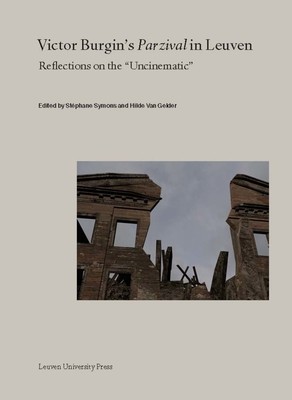
- Išsiųsime per 10–14 d.d.
- Leidėjas: Leuven University Press
- ISBN-10: 9462700990
- ISBN-13: 9789462700994
- Formatas: 17.2 x 22.6 x 1.2 cm, minkšti viršeliai
- Kalba: Anglų
- Extra -15 % nuolaida šiai knygai su kodu: ENG15
Victor Burgin's Parzival in Leuven + nemokamas atvežimas! | knygos.lt
Atsiliepimai
Aprašymas
In commemoration of the destruction of the University Library of Leuven (Belgium) in August 1914, the projection work Parzival, created by Victor Burgin (UK, 1941) in 2013, was installed within the rebuilt Library. The installation uniquely marked the 100th anniversary of the beginning of World War I, which left its profound traces on both the consciousness and physiognomy of the city of Leuven. Burgin's reflection on Richard Wagner's opera Parsifal (premiere 1882) combines the artist's computer modelled images (a bombed out street, a sunset meadow, a Venetian palazzo, ) with citations from Roberto Rossellini's Germany Year Zero (1948) and references to works by Milan Kundera, W.G. Sebald and Philip K. Dick.
This publication provides an in-depth analysis of Parzival, a work that is inspired by the period of seven months that Wagner spent in Venice (1858-1859). Burgin's Parzival raises questions about some of the most fundamental elements in Wagner's operatic work: the longing for a savior, the complex connection between violence and catharsis, and the presentiment that destruction awaits humanity in the future (Götterdämmerung). In an associative manner, Parzival brings together various artistic and political features to confront the romantic ideal of the ruin with the horrors that might result from such a myth.
In addition, this book contains a reprint of Michel Foucault's essay "The Imagination of the Nineteenth Century" (1980).
Contributors
Geert Bouckaert (KU Leuven), Victor Burgin (University of California, University of London, University of Southampton), Alexander Streitberger (Universite catholique de Louvain), Stephane Symons (KU Leuven), Hilde Van Gelder (KU Leuven)
EXTRA 15 % nuolaida su kodu: ENG15
Akcija baigiasi už 20:37:03
Nuolaidos kodas galioja perkant nuo 10 €. Nuolaidos nesumuojamos.

- Leidėjas: Leuven University Press
- ISBN-10: 9462700990
- ISBN-13: 9789462700994
- Formatas: 17.2 x 22.6 x 1.2 cm, minkšti viršeliai
- Kalba: Anglų
In commemoration of the destruction of the University Library of Leuven (Belgium) in August 1914, the projection work Parzival, created by Victor Burgin (UK, 1941) in 2013, was installed within the rebuilt Library. The installation uniquely marked the 100th anniversary of the beginning of World War I, which left its profound traces on both the consciousness and physiognomy of the city of Leuven. Burgin's reflection on Richard Wagner's opera Parsifal (premiere 1882) combines the artist's computer modelled images (a bombed out street, a sunset meadow, a Venetian palazzo, ) with citations from Roberto Rossellini's Germany Year Zero (1948) and references to works by Milan Kundera, W.G. Sebald and Philip K. Dick.
This publication provides an in-depth analysis of Parzival, a work that is inspired by the period of seven months that Wagner spent in Venice (1858-1859). Burgin's Parzival raises questions about some of the most fundamental elements in Wagner's operatic work: the longing for a savior, the complex connection between violence and catharsis, and the presentiment that destruction awaits humanity in the future (Götterdämmerung). In an associative manner, Parzival brings together various artistic and political features to confront the romantic ideal of the ruin with the horrors that might result from such a myth.
In addition, this book contains a reprint of Michel Foucault's essay "The Imagination of the Nineteenth Century" (1980).
Contributors
Geert Bouckaert (KU Leuven), Victor Burgin (University of California, University of London, University of Southampton), Alexander Streitberger (Universite catholique de Louvain), Stephane Symons (KU Leuven), Hilde Van Gelder (KU Leuven)




Atsiliepimai